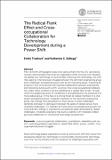The Radical Flank Effect and Cross-occupational Collaboration for Technology Development during a Power Shift
Author(s)
Truelove, Emily Stecker; Kellogg, Katherine C.
DownloadTruelove and Kellogg_Radical Flank Effect.pdf (291.0Kb)
PUBLISHER_CC
Publisher with Creative Commons License
Creative Commons Attribution
Terms of use
Metadata
Show full item recordAbstract
This 12-month ethnographic study of an early entrant into the U.S. car-sharing industry demonstrates that when an organization shifts its focus from developing radical new technology to incrementally improving this technology, the shift may spark an internal power struggle between the dominant engineering group and a challenger occupational group such as the marketing group. Analyzing 42 projects in two time periods that required collaboration between engineering and marketing during such a shift, we show how cross-occupational collaboration under these conditions can be facilitated by a radical flank threat, through which the bargaining power of moderates is strengthened by the presence of a more-radical group. In the face of a strong threat by radical members of a challenger occupational group, moderate members of the dominant engineering group may change their perceptions of their power to resist challengers’ demands and begin to distinguish between the goals of radical versus more-moderate challengers. To maintain as much power as possible and prevent the more-dramatic change in engineering occupational goals demanded by radical challengers, moderate engineers may build a coalition with moderate challengers and collaborate for incremental technology development.
Date issued
2016-04Department
Sloan School of ManagementJournal
Administrative Science Quarterly
Publisher
Sage Publications
Citation
Truelove, Emily, and Katherine C. Kellogg. “The Radical Flank Effect and Cross-Occupational Collaboration for Technology Development during a Power Shift.” Administrative Science Quarterly 61.4 (2016): 662–701.
Version: Final published version
ISSN
0001-8392
1930-3815